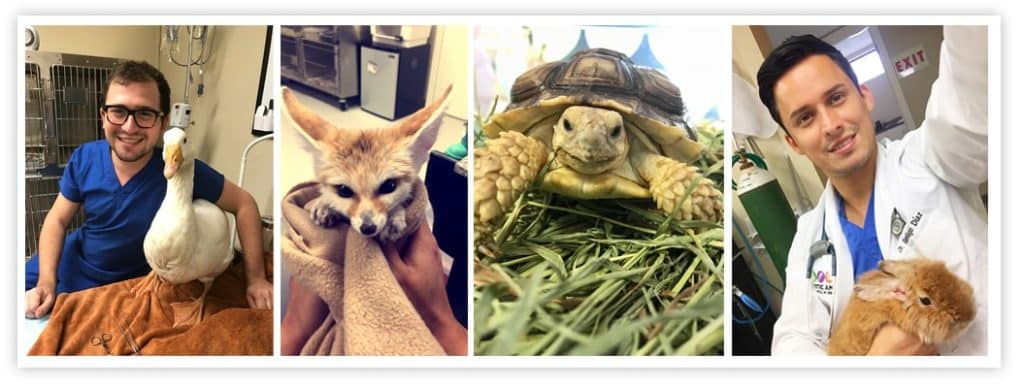
Located centrally in Downtown Orlando, we provide all the medical and surgical needs for your exotic pets including exotic mammals, birds, reptiles, amphibians and fish. Please call us to schedule an appointment.
Located centrally in Downtown Orlando, we provide all the medical and surgical needs for your exotic pets including exotic mammals, birds, reptiles, amphibians and fish. Please call us to schedule an appointment.
Exotic Veterinarian Orlando – Pet Services
At the Exotic Animal Hospital of Orlando we treat and take care of a variety of exotic pets. Some of the most common ones are listed below. During the initial exam, our veterinarian will go over the husbandry, diet, handling and care of your pet. He will also discuss the medical needs, vaccines, and preventive work up needed to keep your pet healthy and happy.
Ferrets
Ferrets are mustelids that require a lot of care, attention and commitment. Their average lifespan is 5-8 years. It is important for ferrets to get an annual physical exam with blood work, distemper vaccines and a deslorelin implant to help prevent adrenal disease. For ferrets that weigh at least 2 lbs (908 grams) the use of Advantage Multi for cats is indicated to treat flea infestations and prevent heartworm disease. Common diseases seen in ferrets include adrenal disease, insulinoma, lymphoma, mast cell tumors, heart disease, dental disease, ear mites, upper respiratory infections and obstruction caused by ingestion of foreign bodies. >> Read More
Rabbits
Part of the order Lagomorpha, rabbits can live for 10-13 years. Their teeth are constantly growing so hay is the most important part of the diet. Rabbits are strict herbivores. They make excellent pets and can live by alone or in small groups. Rabbits need a preventive exam, blood work and a fecal exam once a year. The ideal age to neuter males is at 4 months of age and to spay females at 6 months of age. Common diseases observed in rabbits include dental disease/malocclusion, gastrointestinal stasis, upper respiratory disease, external parasites like mites and fleas, cecal dysbiosis (loose stool), arthritis of the lower lumbar vertebrae and kidney failure. >> Read more
Chinchillas
Chinchillas are rodents from the Andes in South America. In captivity, they can live 12-20 years. Like other rodents, chinchilla’s teeth grow continuously throughout life and hay is a very important part of their diet. Chinchillas require dust baths to maintain a healthy and shiny coat. A yearly preventive exam, blood work and a fecal exam is recommended. Common disease observed in Chinchillas include dental disease/malocclusion, gastrointestinal stasis, cecal dysbiosis (loose stool), ringworm, hair rings on males and upper respiratory infections. >> Read more
Pot-Bellied Pigs
Miniature pet pigs are popular exotic pets in North America. They are a social and highly intelligent species. Males should be neutered at 4 months and females should be spayed at 6 months of age. We recommend performing an annual physical exam with a fecal exam and tetanus vaccines. A monthly preventive medication for external parasites (Revolution) is needed since Pot-bellied pigs are at risk of developing scabies up until 6 months of age. Common diseases seen in pigs include scabies, constipation, dry flaky skin, diarrhea, upper respiratory infections and parasites. >> Read More
Hamsters and Gerbils
There are different species of hamsters kept in captivity like the Syrian and dwarf hamsters. They are nocturnal and have large cheek pouches that enables them to carry large amounts of food. Lifespan can be from 1-3 years. We recommend an annual medical and fecal exam. Common diseases of hamsters include mites, ringworm, diarrhea, dental disease/malocclusion and urinary tract infections.
Gerbils are small rodents native to the desert regions of Mongolia and northeastern China. They are highly social and like to burrow. Lifespan can range from 3-5 years. We recommend an annual medical and fecal exam. Common diseases of gerbils include ringworm, skin infections, diarrhea, dental disease/malocclusion and respiratory infections. >> Read More
Guinea Pigs
Guinea Pigs are rodents from South America. They are very social species and are best kept in small groups. In captivity, Guinea Pigs can live 4-8 years. Their teeth are constantly growing so hay is also an important part of their diet. Furthermore, Guinea Pigs require high levels of vitamin C in their diet to prevent the development of scurvy. A yearly preventive exam, blood work and a fecal exam is recommended. Female Guinea Pigs should be spayed to prevent the development of ovarian cysts. The ideal age for this procedure is at 4-6 months of age. Common diseases include upper respiratory infections, gastrointestinal stasis, ringworm, ovarian cysts, pododermatitis, dental disease/malocclusion, external parasites like scabies and lice, upper respiratory disease, cecal dysbiosis (loose stool) and the formation of stones in the urinary tract. >> Read more
Rats
Rats continue to become more popular as pets as they are very social, intelligent, playful and easy to maintain. Their average lifespan is 2-3 years. We recommend an annual medical and fecal exam. Neutering/spaying your rat will help decrease the incidence of mammary tumors. Males can be neutered at 3 months of age and females can be spayed at 4 months of age. Common medical problems seen in rats include obesity, respiratory infections, dental disease, mammary tumors, pododermatitis, abscesses and lice infestations. >> Read More
Primates
Primates that we commonly see include lemurs, marmosets, tamarins and capuchins. It is mandatory to have a permit to own a primate, and extensive research needs to be done before committing to owning a primate. They need constant attention and supervision. We recommend an annual exam with blood work, viral screening, tetanus vaccine, radiographs, fecal exam and fecal culture. Common problems seen in primates include obesity, heart disease, parasite infestations, respiratory infections and traumatic lesions. >> Read More
Skunks
Skunks make excellent pets and their average lifespan is 6-10 years. Their diet must be closely monitored as they can gain weight easily and develop heart disease. Males should be neutered at 4 months of age and females should be spayed at 6 months of age. A preventive exam, blood work and fecal exam must be performed every year. Skunks can carry roundworms that are transmissible to humans, therefore they need to get a monthly dewormer, even when the fecal exam is negative. The only vaccine that is recommended for skunks is distemper. Common diseases seen in skunks include rectal prolapse, obesity, heart disease and seizures. >> Read More
Parrots
We see a vast array of birds that belong to the parrot or Psittacines group (order Psittaciformes) including macaws, amazon parrots, lovebirds, cockatiels, parakeets, cockatoos, conures and parrotlets. These birds originate from all over the world and their requirements can vary. They are colorful birds that are highly social and intelligent. We recommend an annual physical exam, blood work and fecal test. Common diseases seen in parrots include liver disease, calcium deficiency, metal toxicity, trauma and fractures, feather picking, beak abnormalities, infectious diseases like chlamydia and psittacine beak and feather disease and egg binding. >> Read More
Sugar Gliders
Sugar Gliders are small marsupials from Australia and New Guinea. They are nocturnal and possess a gliding membrane between the front and back legs. Their average lifespan is 12-15 years. We recommend performing a physical and fecal exam once a year. Common diseases seen in sugar gliders include seizures, metabolic bone disease, internal parasites, pouch infections, trauma, self-mutilation, obesity, and dental disease. >> Read More
African Hedgehogs
Small insectivorous mammal that originates from across central Africa. Hedgehogs are nocturnal and are great climbers. Their average lifespan is 5-10 years in captivity. We recommend performing a physical and fecal exam once a year. Common problems seen include obesity, dental disease, upper respiratory infections, loss of quills, external parasites (fleas, ticks and mites), wobbly hedgehog syndrome, kidney disease and bacterial pneumonia. >> Read More
Chickens and waterfowl
We also see a large amount of other avian species like chickens, ducks and geese. They make excellent companion animals and have specific requirements in captivity. We recommend an annual physical exam, blood work and fecal test. Common diseases seen in these species include respiratory infections caused by bacteria and fungi, crop stasis, egg binding, pododermatitis, liver disease, trauma caused by other animals and internal parasite infestations. >> Read More
Amphibians
There are a large number of amphibian species in the world and some of the species most commonly kept as pets include the South American horned frogs, tiger salamanders, waxy monkey tree frog and the African clawed frog. It is important to bring your amphibian for a physical exam once a year. Common diseases in amphibians include skin bacterial and fungal diseases, constipation, low calcium levels and septicemia. >> Read More
Snakes
Common species seen at our practice include red-tailed boas, ball pythons, rat snakes and corn snakes. Just like lizards, these species originate from different parts of the world and their husbandry and care can vary. We recommend bringing your snake once a year for a physical exam and a fecal test. Common diseases seen in most species of snakes include dysecdysis (abnormal shedding), ulcerative stomatitis, egg binding, respiratory infection, retained spectacles, external and internal parasites and some infectious diseases like IBD (inclusion body disease). >> Read More
Lizards
Common species of lizards seen at our practice include bearded dragons, chameleons, leopard geckos, uromastyx, green iguanas and savannah monitors. All these species originate in different parts of the world and their husbandry and diet requirements are very different. We recommend bringing your lizard once a year for a physical exam, blood work and a fecal test. Common diseases seen in most species of lizards include dysecdysis (abnormal shedding), eye infections, infection of the oral mucous membranes, follicular stasis, constipation, cloacal prolapses and internal parasites. >> Read More
Turtles and Tortoises
Chelonians have different adaptations to water and land. Some of the most common species of chelonians we see at our practice include red-eared sliders, sulcata tortoises, red and yellow footed tortoises, leopard tortoises, and box turtles. We recommend bringing your turtle/tortoise once a year for a physical exam and a fecal test. Common diseases seen in most species of chelonians include respiratory infections, constipation, deficiency of vitamin A causing aural abscesses, stones in the urinary tract, obstructions of the GI tract caused by the ingestion of foreign bodies and penis prolapse. >> Read More

